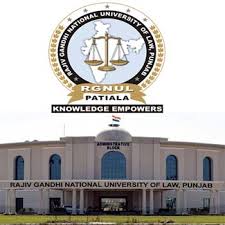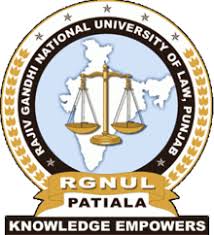Rajiv Gandhi National University of Law (RGNUL)

Rajiv Gandhi National University of Law (RGNUL): Comprehensive Guide
Rajiv Gandhi National University of Law (RGNUL) is one of India’s leading law universities, renowned for its academic rigor, research excellence, and holistic student development. Situated in Patiala, Punjab, RGNUL was established to shape the future of Indian legal education, setting high standards for legal research and professional practice. This comprehensive guide offers an in-depth look at the RGNUL campus, academics, faculty, admission process, placement statistics, campus facilities, student life, and more, making it a valuable resource for prospective students and legal enthusiasts.
1. Overview of Rajiv Gandhi National University of Law (RGNUL)
Established in 2006 under the Rajiv Gandhi National University of Law Act, RGNUL is a premier law university named after former Indian Prime Minister Rajiv Gandhi. The institution is recognized by the University Grants Commission (UGC) and approved by the Bar Council of India (BCI). RGNUL aims to promote global legal education standards while nurturing legal scholars, practitioners, and policymakers of the future. Known for its interdisciplinary approach, the university encourages its students to engage in both national and international legal studies.
2. Location and Campus Infrastructure
RGNUL is located in Sidhuwal, Patiala, Punjab, on a sprawling 50-acre campus that provides a serene environment conducive to academic and personal growth. The state-of-the-art campus features modern classrooms, a fully equipped library, dedicated moot courtrooms, well-furnished hostels, and sports facilities. The campus also offers eco-friendly facilities, including solar panels and rainwater harvesting systems, demonstrating RGNUL’s commitment to sustainability.
Key Infrastructure Highlights:
- Academic Blocks: Equipped with modern lecture halls, seminar rooms, and AV facilities to facilitate a contemporary learning experience.
- Library Complex: The library is one of the largest in North India, with an extensive collection of law books, journals, e-resources, and research papers, ensuring students have access to comprehensive legal information.
- Moot Court Halls: Dedicated moot court halls help students hone their advocacy skills by simulating real-world courtroom scenarios.
- Hostels and Dining Facilities: Separate hostel accommodations for male and female students offer a safe and comfortable stay with mess facilities that provide nutritious meals.
- Sports and Recreation: The university has sports grounds, gym facilities, and other recreational spaces to promote physical well-being and extracurricular activities among students.
3. Academic Programs Offered at RGNUL
RGNUL offers a range of undergraduate, postgraduate, and doctoral programs in law and related disciplines. The academic programs are designed to prepare students with an in-depth understanding of legal theories, frameworks, and practical skills necessary for successful legal careers.
Undergraduate Programs:
- B.A. LL.B. (Hons.): A five-year integrated program that combines arts and law subjects to provide students with a broad understanding of law and related social sciences.
- Eligibility: Admission is through the Common Law Admission Test (CLAT), with a minimum educational qualification of 10+2 (or equivalent) with a specified percentage for different categories.
Postgraduate Programs:
- LL.M. (Master of Laws): A one-year program with specializations in Criminal Law, Constitutional Law, and Business Law. This program is tailored for in-depth research and legal expertise.
- Eligibility: Admission to LL.M. is based on CLAT (PG) scores, with a minimum qualification of an LL.B. or equivalent degree.
Doctoral Programs:
- Ph.D. in Law: This program is intended for those looking to pursue extensive research in various legal fields. RGNUL provides facilities and guidance for doctoral research in a range of specializations, promoting a culture of academic inquiry and innovation.
4. Faculty and Research Centers
The faculty at RGNUL comprises highly qualified academicians, practitioners, and researchers. Many faculty members have national and international experience, bringing diverse perspectives to the classroom. RGNUL’s faculty engage in research and publishing, contributing to scholarly legal discussions and advancements in law.
Research Centers at RGNUL:
- Centre for Advanced Studies in Criminal Law (CASCL): Focuses on research in criminal law, policy reform, and criminal justice.
- Centre for Consumer Protection Law and Advocacy (CCPLA): Promotes awareness and research in consumer rights and protection.
- Centre for Environmental Legal Studies (CELS): Conducts research on environmental issues, legal frameworks, and sustainable development policies.
- Centre for Constitutional Law and Governance (CCLG): Dedicated to research and advocacy in constitutional law and democratic governance.
- Centre for Business Laws and Taxation (CBLT): Specializes in business laws, taxation, and policy development related to commercial laws.
5. Admission Process at RGNUL
Admission to RGNUL’s programs, especially the B.A. LL.B. (Hons.) and LL.M., is highly competitive and is primarily based on scores obtained in the Common Law Admission Test (CLAT).
Undergraduate (B.A. LL.B.):
- Application Process: Apply through the CLAT Consortium’s official portal and select RGNUL during counseling.
- Eligibility: Minimum 10+2 qualification with at least 45% marks (for General/OBC) and 40% (for SC/ST).
- Selection: Based on CLAT scores, followed by counseling and seat allocation.
Postgraduate (LL.M.):
- Application Process: Applications are submitted through the CLAT (PG) portal.
- Eligibility: Completion of an LL.B. degree with a minimum specified percentage (usually around 55% for General/OBC and 50% for SC/ST).
Doctoral (Ph.D.):
- Application Process: Applications are made directly to RGNUL, and candidates are shortlisted based on academic performance, research proposal, and interviews.
6. Student Life and Extracurriculars
RGNUL offers a dynamic student life with a variety of extracurricular clubs, societies, and cultural events. The university encourages students to participate in moot court competitions, debate tournaments, and legal conferences.
Key Student Societies:
- Moot Court Committee (MCC): Organizes moot court competitions and workshops to enhance students’ litigation skills.
- Debating Society: Encourages public speaking and debate skills through regular events and inter-university competitions.
- Literary and Cultural Society: Organizes literary events, cultural fests, and art exhibitions to promote creativity and expression among students.
- Sports Club: Manages the sports infrastructure, organizes tournaments, and encourages students to stay physically active.
7. Placement and Internship Opportunities
RGNUL has a dedicated Career Development and Placement Cell (CDPC) that provides career guidance, internship opportunities, and placement assistance. The placement cell regularly collaborates with leading law firms, corporates, and NGOs to facilitate internships and final placements for students.
Placement Highlights:
- Top Recruiters: Some of the top recruiters include prestigious law firms, multinational corporations, and government agencies.
- Internship Programs: RGNUL has a robust internship program where students intern at law firms, corporate legal departments, and courts to gain practical experience.
8. Notable Alumni
RGNUL has a growing alumni network that includes legal practitioners, judges, academicians, and policymakers. The university’s alumni are actively engaged with RGNUL, contributing to guest lectures, mentorship programs, and workshops.
9. Conclusion
Rajiv Gandhi National University of Law (RGNUL) is a distinguished institution dedicated to fostering a profound understanding of law and justice among its students. With comprehensive academic programs, world-class faculty, and an array of extracurricular activities, RGNUL is one of India’s top destinations for legal education. The university’s emphasis on academic excellence, practical skills, and ethical values has established it as a center of legal education and research, preparing students for meaningful and impactful careers in law.
For students seeking a robust legal education in India, RGNUL offers an exceptional platform to develop academic and professional skills, ensuring a successful legal career ahead.
Courses/Programs
| Serial# | Title | Estimated Cost | Program type |
|---|
Campuses
Reviews
Average rating
0.0 / 5
Rating breakdown
Submit your review

- Location
Rajiv Gandhi National University of Law, Bhadson-Patiala Rd, Sidhuwal, Kishanpur urf Bakhshiwala, Punjab 147001 Click address for directions
- Phone
- Fax
- Web Site